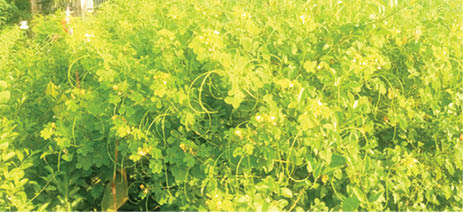Since the removal of fuel subsidy by the federal government, as well as the devaluation of the naira, majority of Nigerians have been plunged into untold economic hardship as the prices of foodstuff and other essential commodities continue to rise on a daily basis.
Many essential commodities like rice, maize, guinea corn, millet and beans have gradually gone out of reach for many citizens, forcing them to adopt alternative means of survival.
Some people who spoke with Weekend Trust said they had abandoned some essential food items and other domestic needs, including toothpaste and cooking oil for cheaper alternatives.
Investigation also revealed that due to exorbitant prices, families now rarely buy semovita and spaghetti as they used to do.
- How we achieved 50% self-sufficiency in wheat — Sudanese farmer
- Power outage: Abuja, Niger ice-blocks to the rescue in Kano
Checks in various markets in Minna in the Niger State capital, revealed that a bag of semovita of 10 packs now goes for N18, 000, while spaghetti costs N18, 500 and N22, 000, depending on the brand.
Some families also told Weekend Trust that because of the cost of toothpaste, they now use charcoal to brush their teeth, saying it is hygienic and there is no hazardous health implication.
Some families have also removed meat and eggs from their menus due to cost, it was gathered.
For creams, some women said they now use shea-butter as an alternative, adding that they buy chemicals to prepare bathing soaps instead of buying detergents and branded soaps.
Our correspondent also learnt that some households in the El-Warizi axis of Bosso in Minna now consume cassia tora leaves, locally known as ‘tafasa for breakfast, lunch or dinner.’ The leaves are fetched from bush, broiled and prepared with kuli-kuli.
Several households told Weekend Trust that the cassia delicacy has served as alternative food for survival for the past few months due to the rising cost of essential food items.
A cross section of residents who spoke with our correspondent lamented a rise in the rate of sudden deaths of heads of families in Minna, in recent times due to increased pressure, trauma and depression mostly caused by struggles to provide for their families.
Mallam Abdullahi Adamu, a resident of Bosso, told our correspondent that many families could no longer eat three times a day.
Mr Gabriel Samson, a resident of Gbeganu area of Minna, who said he was struggling to feed his wife and three children, added that he could not recall the last time they ate rice.
“For months now, I have been buying yam and potatoes despite their cost because that is what gives longer satisfaction. When we cook yam or potato, we eat it with salt and pepper. As we eat, we drink water and the stomach gets filled up easily. And before the children would complain of hunger, it takes hours; and for hours they would continue to drink water. But if they eat rice, in a few minutes, they start complaining of hunger.
“Also, until now, maize was not affordable. And even if you buy maize, the process of making it into food is long as you need money to grind it and buy oil and Maggi cubes to prepare soup. But you can boil yam and potatoes and eat without any soup. Sometimes, I buy N10,000 yam, but it is still better than buying maize or rice because it can easily be prepared and consumed,” Samson said.
Mallam Aliyu Usman also said they now use charcoal in place of toothpaste so as to save the money for buy food items.
He said, “We grind charcoal and put it on our fingers to brush our teeth; we don’t use it with toothbrush. And for food, we buy what is affordable at any moment.
“People now sweep markets looking for leftover maize, guinea corn and millet, which they will sieve and sell. Sometimes that is what I buy because it is cheaper. When you grind it, it is neither maize flour, guinea corn nor millet flour. The concern is not how it looks but let something enter one’s stomach.”
Mohammed Musa, a father of three, also told Weekend Trust that his household resorted to garri as their major food due to the cost of other food items.
“The food item I buy most in my house now is garri. We soak it with kuli-kuli for lunch and make eba almost everyday for breakfast and dinner. We are not after balanced diet now but how to get something in the stomach,” he said.
On his part, Abubakar Abdul said he resorted to maize flour, garri and sweet potatoes in place of rice and semovita.
Victoria Baba also told our correspondent that she now uses refined shea-butter as cream, saying it is cheaper and lasts longer. She also revealed that most households now prepare liquid soap in place of detergent to cut cost.
“If you buy chemicals and prepare your own detergent, it is cheaper and lasts longer. Most women now buy chemicals and prepare their detergent at home because prices of industrial detergents are going out of the reach of common Nigerians. God will continue to help us,” she said.
Mallama Saudatu Ibrahim, a widow told Weekend Trust at Kure Ultra Modern Market, Minna, that she cannot remember the last time she prepared her meals with oil due to cost.
She said, “Once I have seasoning cubes and salt, I prepare my food like that. I have stopped using cooking oil for long. What I am after is for myself and the children to get something to eat.”
Checks at the Kure Ultra Modern Market revealed that 25 liters of Kings Oil goes for N80,000 while a bottle is sold at N2,800. Also, a bottle of palm oil costs N1,800 as against N1,200 it was sold previously.
Weekend Trust also learnt that some families have stopped eating meat due to cost as butchers rarely sell N1,000 worth of fresh meat.
Nutritionist warns
A nutritionist, Hajara Imam, warned that excessive consumption of carbohydrates such as yam and garri could lead to a spike in glucose in the body and cause diseases like diabetes.
She also though Cassie tora traditionally known as Tafasa is a vegetable that helps in building bones, excessive consumption could cause diarrhoea and constipation.
“Excessive consumption of carbohydrates is not good for the body. When you take too much of carbohydrates, it is stored as glucose in the body which spikes up your glucose level and it could lead to some illnesses.
“So, it is better when you take carbohydrates, you add protein; like beans or vegetable. But with the current hardship some people say they consume only yam every day with pepper, it will be good to add some vegetables. If you eat yam with pepper in the morning, you can make yam portage using the same pepper and oil with vegetables in the afternoon or evening. It’s not healthy to consume carbohydrates through out the day”, she said.
Farmers react as Niger govt constitutes price control board
Farmers in the state have described the constitution of a price control board by the government as an attempt to exploit and shortchange them.
Farmers who spoke with our correspondent lamented that they bought inputs at exorbitant prices without any support from the government, and wondered why it would fix prices of commodities when it did not support them during the planting season.
Weekend Trust had reported how government-subsidised fertilisers ended in the hands of a few politicians, traditional rulers and dealers while the real farmers did not have anything to buy.
Some government officials who were allocated the fertilisers eventually sold them to dealers, who in turn sold at market prices.
The secretary, Yam Farmers Association, Mutun-Daya, Munya Local Government Area, Sani B. Sarki, said the decision to regulate the prices of farm was wrong, adding that some farmers took loans to buy inputs, such as chemicals, fertiliser and seeds and would have to pay back from the sale of their produce.
“How is that possible when farmers were not supported by the government? We didn’t get government-subsidised inputs to buy. We bought from the market and need to recover our investments. Farmers are not the cause of the rising cost of foods,” he said.
A farmer in Lavun Local Government Area, Alhaji Bala Yahaya, told our correspondent that he spent over N600,000 installing solar panels, through which he was able to pump water to his rice farm during the slight drought experienced in most parts of the state.
Mallam Salihu Ibrahim, a farmer in Gbako Local Government Area, said he spent N187,000 on fertiliser he applied on his maize farm without any support from the government.
“Where was the government when we were buying inputs at market price? The purported government-subsidised fertiliser did not get to us. I spent N187,000 on fertiliser, which I applied on my maize farm to get the 12 bags I harvested. I spent over N300,000 in total. The government that did not support us now wants to decide how we should sell our produce. That is insensitivity,” he said.
The Niger State government had in October 17, 2024 established an eight-member State Price Control and Monitoring Board to ensure fair pricing and consumer protection.
The secretary to the Niger State Government, Alhaji Abubakar Usman, who inaugurated the board in his office, said the decision was a significant step, adding that the board was expected to control and stabilise prices of essential commodities across the state, eradicate or reduce to the barest minimum, hoarding of essential commodities and quick response to issues that may arise as a result of enforcement and penalty for contravention of guidelines, among several others.

 Join Daily Trust WhatsApp Community For Quick Access To News and Happenings Around You.
Join Daily Trust WhatsApp Community For Quick Access To News and Happenings Around You.


